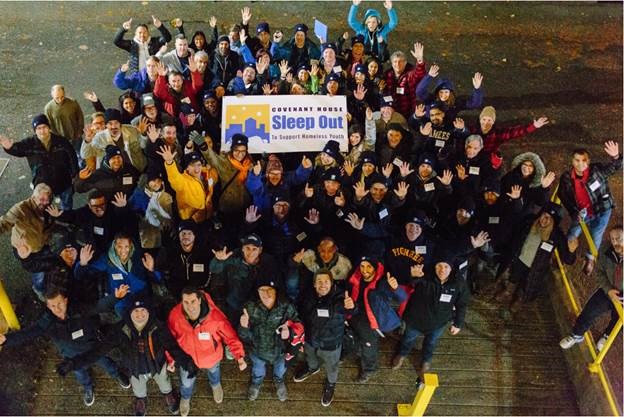There were another 60 or so of us on the streets of Vancouver overnight in the chilled rain.
It is in many ways a sad statement of what has to be done today to bring attention to a homelessness problem that is chronic and complacently accepted as a feature of a city with such wealth and privilege.
The extra few dozen in sleeping bags on a bed of cardboard in a large driveway on the edge of our downtown were participating in the annual Sleep-Out: Executive Edition for Covenant House Vancouver. In 18 other cities overnight, hundreds did the same for other Covenant Houses.

Participants in the Sleep Out: Executive Edition in Vancouver raised almost $900,000 for Covenant House
We came mainly from the ranks of business, principally because of our capacity to tap into our networks for support. Nearly $900,000 (and counting) was raised locally from about 3,800 people for the successful Crisis Program that helps struggling young women and men, tailors a path of counsel and compassion and aims to rekindle lives lost to trauma, violence, addiction, mental illness and abuse.
Nearly 400 aged 16 to 25 stayed in the program for food and shelter in the overrun 59-bed facility this year alone. More than two-thirds had come from homes of violence, one-third were victims of sexual abuse, half were amid substance abuse, two in five were dealing with mental illness. They were among the 500 to 1,000 youth and the more than 2,100 adults in Vancouver and 3,600 in Metro Vancouver on the streets.
We spent part of the night hearing from three who had been helped and were on the road back: one who had overcome addictions and reconnected with family, entered college and was about to get his own apartment; another who had aged out of foster care and found she had nowhere else to turn to deal with her challenges; a third who had moved into peer support and will pursue a degree in social work to help others like him.
The sensory experience of the Sleep-Out, particularly in November, is not to be taken lightly. The snippets of rest easily succumb to the elements. It is but a tiny taste of what life would be like – only without fear, without flight, without worries about the day ahead. Big withouts.
The damp cold is upon you instantly and constantly, even with the luxury of warm and dry clothes and a conscious purpose of heading to sleep. It has been wet all week, so the cardboard you lay on the concrete is only momentarily helpful. The sleeping bag retains just enough heat to not further sap energy.
There is a mix of incessant or startling sound: the white noise of constant traffic on wet pavement, sirens galore, a street sweeper, people coming home from the bar. Rain was not in the forecast, but it came anyway – thankfully intermittent and only briefly intense, but it could not help but keep the inexperienced awake and uncomfortable.
The ground is not a mattress. You arise sore and numb. Your first steps are tentative and disoriented. But it is only one night, not dozens or hundreds.
That we need Covenant House, and that we are building a larger one in Vancouver, speaks volumes of systemic failure and the reliance on private benevolence in an environment of public insufficiency.
Only 6% of the facility’s operational funds come from government; the Sleep-Out will support the Crisis Program for about 60 or 70 days in the coming year, among many more programs there and elsewhere at agencies that need and deserve assistance.
Participation in the Sleep-Out is a statement of frustration with that system and of determination not to let its shortcomings shortchange.
You are awakened, if you are not already up, around 5 a.m. You share stories, hear letters read aloud from grateful graduates of the program, swill coffee and tea, get some calories into the system, and head to work or home, first passing a CrossFit program of young women and men lifting weights en route to your car.




